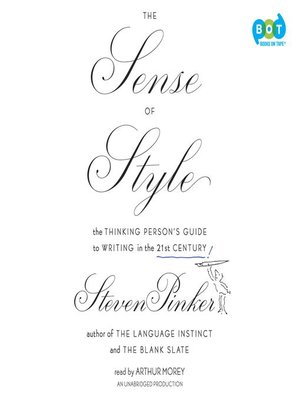
Instead, he applies insights from the sciences of language and mind to the challenge of crafting clear, coherent, and stylish prose. Rethinking the usage guide for the twenty-first century, Pinker doesn’t carp about the decline of language or recycle pet peeves from the rulebooks of a century ago.

In The Sense of Style, the bestselling linguist and cognitive scientist Steven Pinker answers these questions and more. Either that, or he wasn't aiming for student writers as his audience (I can't imagine my students making sense of many of the more technical explanations, given the extent to which they rely upon linguistic concepts that aren't spelled out nearly enough for a freshman!), but in that case I'm not really sure WHO his intended audience is - surely not just fellow writing-inclined psycholinguists like me? But as I said, I really enjoyed the book I already teach writing from the perspective of a cognitive scientist so much of it was not entirely new, but it did give me some ideas for my class.Why is so much writing so bad, and how can we make it better? Is the English language being corrupted by texting and social media? Do the kids today even care about good writing? Why should any of us care? But as a writing teacher, I was also reading it with an eye towards sharing parts of it with my students (college freshmen) and I'm afraid it won't fly, there - despite having an entire chapter on the "curse of knowledge" and the challenges of taking audience knowledge into account (which I loved - I mean, that's what my dissertation was about!), he seems to have fallen victim to it himself. Forgive me for lacking a thorough command of Yiddish, but isn't it narcissistic to think everyone grew up using the same jargon?įor me, as a reader who is a cognitive scientist and writing teacher and therefore obsessed with the same things as Pinker, this was a great book. They were nouns plopped in a sentence like raisins in a pie. So why was I forced to look up words every few pages? These were not words used in a context that would allow me to discern their meaning and thereby learn how to use them in my own writing. He states a writer should use simple words, and not rely on clever obfuscations and antiquated vocabulary. Pinker's writing is elegant, thoughtfully composed and rid of unnecessary clutter.

But look at this sample where they did it. Yet what style guide would suggest such a strategy? Here are the rules. We step back a moment when we read an unusual opening sentence, or when a story ends precipitously with a since word. Reading a style guide is the ultimate paradox, for on the one hand the author sites examples of what makes good writing and on the other hand demonstrates how interesting it is to read original writing by authors who dare to challenge convention. While I haven't finished this book in the strict sense of the word, I'm finished with this book.


 0 kommentar(er)
0 kommentar(er)
